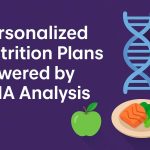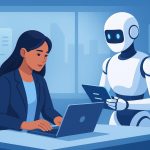Artificial Intelligence has already changed the way we work, but 2026 marks a major shift — the rise of autonomous AI agents. Unlike chatbots or simple AI assistants, these intelligent agents can plan, execute, and adapt to tasks with minimal human supervision. They are not just answering questions or generating content; they are taking action, coordinating with tools, and making decisions.
In this article, we’ll explore what autonomous AI agents are, how they will reshape work, their benefits and challenges, and the skills you’ll need to thrive in an AI-powered workplace.
🧠 What Are Autonomous AI Agents?
Autonomous AI agents are self-directed software systems that can perform complex tasks by reasoning, learning, and acting on their own. They go beyond traditional AI assistants like Siri or Alexa.
For example:
- An AI sales agent can research leads, draft personalized emails, follow up automatically, and schedule calls.
- A project management agent can assign tasks, monitor deadlines, and notify team members when priorities shift.
- A coding agent can detect bugs, fix them, and deploy code updates without manual intervention.
In 2026, thanks to breakthroughs in large language models (LLMs), multi-agent systems, and tool integration, these agents can collaborate with other AI systems and even with humans in real time.
🚀 The Evolution of AI in the Workplace
The journey to autonomous AI agents didn’t happen overnight.
- 2018–2022: AI chatbots and assistants emerged, focusing on answering simple questions.
- 2023–2024: Generative AI tools like ChatGPT and Midjourney popularized AI content creation.
- 2025: Early autonomous agents such as AutoGPT and BabyAGI demonstrated the ability to chain tasks together.
- 2026: Companies are deploying enterprise-level AI agents across industries, automating entire workflows.
This shift means that AI is no longer a passive tool — it’s becoming a proactive teammate.
🏢 How Autonomous AI Agents Are Transforming Everyday Work
1. Workflow Automation on Steroids
Imagine starting your day and finding your AI agent has already:
- Summarized your emails
- Prepared a prioritized to-do list
- Scheduled meetings
- Flagged urgent issues
This hyper-automation will save hours of manual effort every week, freeing employees to focus on creativity and strategy.
2. 24/7 Productivity & Global Collaboration
AI agents don’t sleep. Businesses can operate around the clock with agents handling customer support, data analysis, and content updates even outside business hours. This is especially powerful for global teams across multiple time zones.
3. Smarter Decision-Making
Autonomous agents can analyze real-time data, run simulations, and recommend the best course of action faster than any human team. This allows companies to react quickly to market changes.
4. Personalized Work Experience
Instead of one-size-fits-all software, AI agents learn your personal work style — the way you prefer reports formatted, the tools you use, and how you communicate. The result is a tailor-made digital assistant for each employee.
📊 Industries Being Disrupted by AI Agents in 2026
- Marketing: AI handles SEO research, content creation, social scheduling, and A/B testing automatically.
- Finance: Agents reconcile transactions, detect fraud, and generate real-time financial forecasts.
- Healthcare: Virtual care agents coordinate appointments, track patient data, and alert doctors about anomalies.
- Software Development: Coding copilots evolve into full autonomous dev agents, able to build and deploy apps end-to-end.
- Customer Support: AI agents provide instant, multilingual responses and escalate only complex cases to humans.
✅ Benefits of Autonomous AI Agents
- Massive Productivity Gains – Employees spend less time on repetitive tasks.
- Cost Efficiency – Companies save money by automating workflows previously requiring large teams.
- Faster Innovation – AI-driven insights accelerate decision-making and experimentation.
- Consistency & Accuracy – Less human error in reporting, data entry, or communication.
- Scalability – Businesses can scale operations without proportionally increasing workforce size.
⚠️ Challenges and Risks
While autonomous AI agents offer huge benefits, there are risks to address:
- Job Displacement: Some roles may become obsolete, requiring reskilling.
- Over-Reliance on AI: Businesses risk blind trust if they don’t verify outputs.
- Data Privacy: AI agents must handle sensitive data securely.
- Ethics & Accountability: Who is responsible if an AI makes a wrong decision?
Governments and companies will need clear AI governance frameworks to balance automation with human oversight.
🧩 Skills Workers Need in 2026
The rise of autonomous AI agents doesn’t mean humans are out of the picture. Instead, human-AI collaboration will be key. Workers should focus on:
- AI Literacy: Understanding how AI works and what it can/can’t do
- Critical Thinking: Validating AI outputs and making ethical decisions
- Creativity & Strategy: Leveraging freed-up time for innovation
- Prompt Engineering & Workflow Design: Communicating effectively with AI tools
- Emotional Intelligence: Managing teams and customer relationships in an automated world
🔮 The Future of Work: Human + AI Teams
In 2026, the workplace is evolving into a hybrid ecosystem where humans and AI work side by side. AI agents will handle the busywork, while humans focus on leadership, creativity, and big-picture thinking.
Rather than replacing jobs outright, autonomous AI will create new roles — AI trainer, AI ethicist, automation designer — much like how the internet created jobs that didn’t exist 25 years ago.
🏁 Final Thoughts
The rise of autonomous AI agents in 2026 is one of the biggest transformations in the history of work. Businesses that adopt these agents early will enjoy faster growth, lower costs, and a competitive advantage. Employees who embrace AI collaboration, learn new skills, and focus on human strengths will thrive in this new era.





